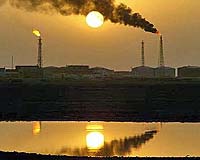 |
UPI International Correspondent Washington (UPI) Nov 30, 2007 Following the death of Turkmen President Saparmurat Niyazov last December, U.S. energy companies eagerly braced themselves for a possible opening up of the country's vast natural gas resources under a new administration. Alas, in a world of record-high energy prices, Wall Street bulls seem once again to have been outmaneuvered by the wily Kremlin. Turkmen President Gurbanguly Berdymukhamedov has decided to back a tripartite commitment he made on May 12 in Turkmenistan's Caspian port of Turkmenbashi along with Russian President Vladimir Putin and Kazakh President Nursultan Nazarbayev to construct a Caspian littoral pipeline skirting the inland sea's eastern shore and develop Central Asian gas transportation facilities. The agreement was paired with an accompanying deal to upgrade Uzbekistan's Soviet-era energy infrastructure. "We're making special steps to promote the Caspian littoral pipeline project," Berdymukhamedov said. The Caspian littoral pipeline will help increase the exports of Turkmen natural gas, already the world's fourth largest, to Russia by 20 percent and is scheduled in the first stage to deliver 10 billion cubic meters of gas per year by 2009-2010. Russia's increasing influence in Turkmenistan is reflected in rising bilateral trade; for the period January-September, trade excluding the transit of Turkmen gas grew 40 percent over the same period in 2006 to $280 million. Adding in Russia's payment for transit of Turkmen gas, according to Turkmen statistics, revenue for the same period has reached $2 billion. The decision comes despite lobbying by U.S. Energy Secretary Samuel Bodman, who met with Berdymukhamedov Nov. 15 after attending the Oil and Gas of Turkmenistan -- 2007 forum in Ashgabat. Bodman is certainly aware of the potential value of the prize, telling conference participants: "Turkmenistan certainly has significant reserves; in fact, it may have one of the largest natural gas reserves in the world -- and it has significant oil reserves." While in Ashgabat, Bodman, the highest-ranking U.S. administration official to visit Turkmenistan for years, met with top Turkmen officials. While Turkmenistan is reported to be among the world's top five countries in terms of natural gas reserves, there has been no independent audit of the country's deposits, estimated between 2.1 trillion and 7 trillion cubic meters, of which in 2007 the state planned to extract 70 billion to 80 billion cubic meters of gas. The Turkmen government has thus far surveyed about 180 oil, gas and gas condensate deposits; only about one-third of them are being developed and in production. Two speeches epitomized the issues at stake at the forum, and why Bodman's efforts seemed to come in second. While Turkmen Oil Minister Baimurat Khojamukhammedov told his audience Turkmenistan's potential to enter global markets depends on upgrading its gas-transport system, he added Turkmenistan's strategic energy partners were "Russia, China and other countries." While the Turkmen government in the past has been deeply unhappy with Gazprom's pricing mechanism, both Russia's and Turkmenistan's political systems emerged from the debris of the 1991 Soviet collapse, giving both nations a common heritage. Bodman, in contrast, came with a tall order for change totally at odds with Turkmen political reality, telling his audience, "In order for these partners to invest their capital and their expertise, they will need a transparent, stable and market-oriented legal, fiscal and regulatory framework." For a nation less than a year removed from what was commonly regarded as one of the world's most repressive dictatorships, evolving a "transparent, stable and market-oriented legal, fiscal and regulatory framework" in order to entice Western investment seems a rather tall order. Berdymukhamedov himself encouraged American optimism; during a September visit to the United States he said, "Turkmenistan gives primary importance to developing relations with the United States, particularly in oil and gas." Washington in turn has been promoting an undersea Caspian pipeline linking Turkmen production fields to Baku's transmission grid, which would eventually deliver Turkmen gas to Europe through Azerbaijan, Georgia and Turkey and via the proposed future Nabucco gas pipeline, which will be laid across Bulgaria, Romania and Hungary. All that is required for Western capital investment to flow to begin constructing this massive network is a "transparent, stable and market-oriented legal, fiscal and regulatory framework." In retrospect, it is hardly surprising that Berdymukhamedov for the present has decided to go with his familiar "strategic energy partners." If Washington can tone down its free-market rhetorical mantra and begin to deal with the country as it actually is, then it may yet find some scraps from the table at the Oil and Gas of Turkmenistan -- 2008 forum.
Source: United Press International Related Links Powering The World in the 21st Century at Energy-Daily.com
 London (UPI) Nov 30, 2007
London (UPI) Nov 30, 2007The leader of Iraq's oil workers, attending an anti-war conference here, says Iraq could be producing more oil by investing its own money, without an oil law or large scale foreign oil company involvement. |
|
| The content herein, unless otherwise known to be public domain, are Copyright Space.TV Corporation. AFP and UPI Wire Stories are copyright Agence France-Presse and United Press International. ESA Portal Reports are copyright European Space Agency. All NASA sourced material is public domain. Additional copyrights may apply in whole or part to other bona fide parties. Advertising does not imply endorsement, agreement or approval of any opinions, statements or information provided by Space.TV Corp on any Web page published or hosted by Space.TV Corp. Privacy Statement |